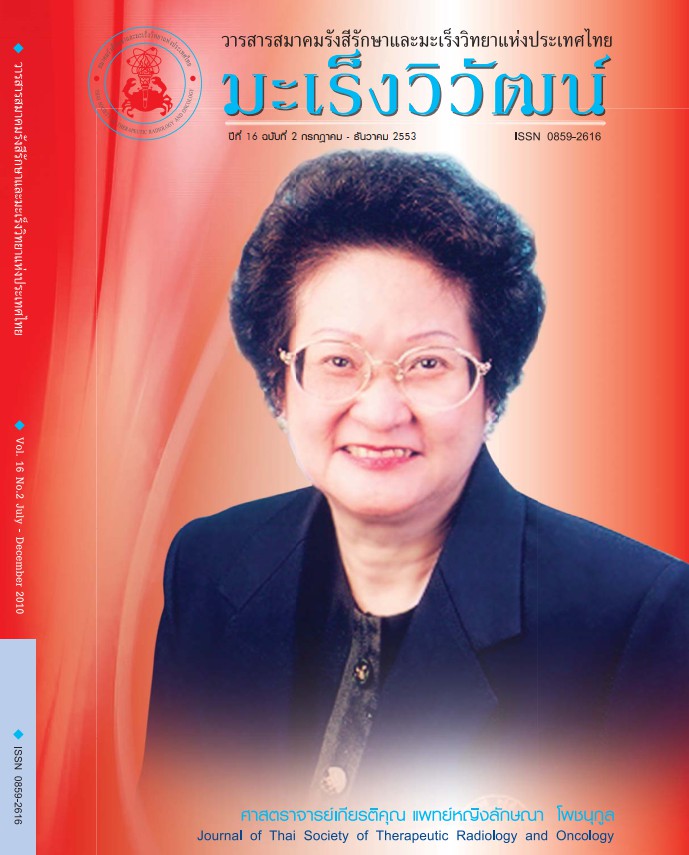Hypofractionation for Prostate Cancer
บทคัดย่อ
บทความนี้เป็นการวิเคราะห์ถึงการรักษามะเร็งต่อม ลูกหมากด้วยวิธีHypofractionation Regimen มีหลาย การ ศึกษาซึ่งแสดงว่าค่าโดยเฉลี่ยของ alpha/beta ratio ของมะเร็งต่อมลูกหมากนั้นต่ำโดยเฉลี่ยประมาณ 1-3 Gy ซึ่ง ต่ำกว่าค่าของ alpha/beta ratio ของอวัยวะปกติที่ อยู่ใกล้ต่อมลูกหมากซึ่งได้แก่กระเพาะปัสสาวะและ ลำไส้ใหญ่ส่วนปลายดังนั้นการใช้วิธีการรักษาด้วย Hypofractionated Regimen น่าจะเป็นการเพิ่ม Therapeutic Ratio ได้ซึ่งก็ สอดคล้องไปกับ Phase III Randomized Control Trial ฉบับล่าสุดซึ่งได้แสดงให้ เห็นว่ากลุ่มที่ได้ Hypofractionated Regimen มีค่า Freedom From Biochemical Failure Rate ดีกว่า กลุ่มที่ได้ Conventional Regimen นอกจากนั้น Late Toxicity ของทั้ง GI and GU ก็ไม่ได้แตกต่างกันแต่ อย่างไรก็ตาม Fractionation schedule ในการรักษามะเร็งต่อมลูกหมากด้วยวิธี Hypofractionation นั้นยังไม่มี ข้อสรุปที่ชัดเจนคงต้องรอการศึกษาต่อไปในอนาคต
เอกสารอ้างอิง
Pollack A, Zagars GK, Starkschall G, et al. Prostate cancer radiation dose response: results of the M. D. Anderson phase III randomized trial. Int J RadiatOncolBiol Phys 2002;53(5):1097-105.
Peeters ST, Heemsbergen WD, Koper PC, et al. Dose-response in radiotherapy for localized prostate cancer: results of the Dutch multicenter randomized phase III trial comparing 68 Gy of radiotherapy with 78 Gy. J ClinOncol 2006;24(13):1990-6.
Brenner DJ, Hall EJ. Fractionation and protraction for radiotherapy of prostate carcinoma. Int J RadiatOncolBiol Phys 1999;43(5):1095-101.
Fowler J, Chappell R, and Ritter M. Is alpha/beta for prostate tumors really low? Int J RadiatOncol-Biol Phys 2001;50(4):1021-1031.
Williams SG, Taylor JM, Liu N, et al. Use of individual fraction size data from 3756 patients to directly determine the alpha/beta ratio of prostate cancer. Int J RadiatOncolBiol Phys 2007; 68(1):24-33.
Liao Y, Joiner M, Huang Y, et al. Hypofractionation: What dose it mean for prostate cancer treatment? Int J RadiatOncolBiol Phys 2010;76(1):260-268
Lukka H, Hayter C, Warde P, et al. A randomized trial comparing two fractionation schedules for patients with localized prostate cancer. J ClinOncol2005;23:6132-6138.
Yeoh EE, Fraser RJ, McGowan RE, et al. Evidence for effi cacy without increased toxicity of hypofractionated radiotherapy for prostate carcinoma: Early results of a phase III randomized trial. Int J RadiatOncolBiol Phys 2003;55:943-955.
Miles EF, Lee WR. Hypofractionation for Prostate Cancer: A Critical Review. SeminRadiaitOncol 2008;18:41-47.
Arcangeli G, Saracino B, Gomellini S, et al. A Prospective Phase III Randomized Trial of Hypofractionation Versus Conventional Fractionation in Patients with High-risk prostate cancer. Int J RadiatOncolBiol Phys. 2010 Jan 2. [Epub ahead of print]
Marzi S, Saracino B, Petrongari MG, et al. Modeling of alpha/beta ratio for late rectal toxicity from a randomized phase II study: conventional versus hypofractionated scheme for localized prostate cancer. Journal of Experimental & Clinical Cancer Research 2009;28:117.
ดาวน์โหลด
เผยแพร่แล้ว
รูปแบบการอ้างอิง
ฉบับ
ประเภทบทความ
สัญญาอนุญาต
บทความที่ได้รับการตีพิมพ์เป็นลิขสิทธิ์ของวารสารมะเร็งวิวัฒน์ ข้อความที่ปรากฏในบทความแต่ละเรื่องในวารสารวิชาการเล่มนี้เป็นความคิดเห็นส่วนตัวของผู้เขียนแต่ละท่านไม่เกี่ยวข้องกับ และบุคคลากรท่านอื่น ๆ ใน สมาคมฯ แต่อย่างใด ความรับผิดชอบองค์ประกอบทั้งหมดของบทความแต่ละเรื่องเป็นของผู้เขียนแต่ละท่าน หากมีความผิดพลาดใดๆ ผู้เขียนแต่ละท่านจะรับผิดชอบบทความของตนเองแต่ผู้เดียว




